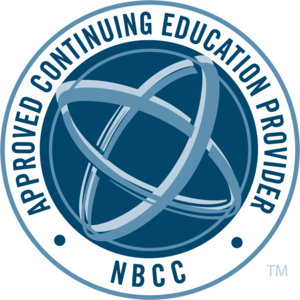Counselor Education

The UNM Counselor Education Program is an approved continuing education provider. NBCC ACEP Number 3013.
Mission Statement (CACREP S.1.N)
The Counselor Education Program prepares students to address the counseling and human development needs of a pluralistic society. The program recruits and retains students who reflect the broad range of diversity found in New Mexico. Students graduate with knowledge and skills in core competency areas that include professional identity, social and cultural foundations, human growth and development, career development, helping relationships, group work, assessment, and research and program evaluation.
The Counselor Education Program features an integration of theory, research, practice, and interdisciplinary collaboration. It is intended to prepare counselors who are informed; who will be sensitive to the diversity and uniqueness of individuals, families, and communities; and who will value and promote the dignity, potential, and well-being of all people. The program prepares professional school and clinical mental health counselors (master’s level) and counselor educators (PhD level) to respond to a world with challenging and pressing social problems.
Faculty members are committed to integrating teaching, scholarship, research, clinical practice, and service, while promoting a climate of social justice, systemic change, and advocacy. The faculty’s goal is to infuse multicultural and diversity training in all aspects of academic and clinical coursework in order to prepare multiculturally competent counselors and counselor educators. From the beginning of the graduate course of study, classroom education is combined with real-world integration and experiences. These experiences provide the opportunity for students to work in and with various educational settings and community agencies.
Aspirations
(CACREP S.1.N)
Consistent with the goals and vision of UNM and the College of Education & Human Sciences, the Counselor Education Program is committed to promoting excellence and diversity in teaching, scholarship, and community service. Faculty and students work to promote an understanding of human development and psychological health that will improve and foster optimal potential for individuals, families, and our communities.
The program features an integration of theory, research, and practice along with interdisciplinary collaboration that is intended to prepare counselors who are informed; who will be sensitive to the diversity and uniqueness of individuals, families, and communities; and who will value and promote the dignity, potential, and well-being of all people.
Program Objectives
MASTER’S PROGRAMS
PROFESSIONAL COUNSELING ORIENTATION AND ETHICAL PRACTICE
PROGRAM OBJECTIVE: Students will become competent in the knowledge and skills of
professional counseling, orientation and ethics.
SOCIAL AND CULTURAL DIVERSITY
PROGRAM OBJECTIVE: Students will develop competency regarding cultural pluralism and intersectionality; gaining specific knowledge about impact of heritage, attitudes, beliefs, understandings, and acculturative experiences on an individual’s views of others.
HUMAN GROWTH AND DEVELOPMENT
PROGRAM OBJECTIVE: Students will identify and discern systemic and environmental factors that affect human development, functioning and behavior.
CAREER DEVELOPMENT
PROGRAM OBJECTIVE: Students will develop strategies for assessing abilities, interests, values, personality and other factors that contribute to career development.
COUNSELING AND HELPING RELATIONSHIPS
PROGRAM OBJECTIVE: Students will ascertain a systems approach to conceptualizing clients.
GROUP COUNSELING AND GROUP WORK
PROGRAM OBJECTIVE: Students will develop skills necessary for conducting group work; including theoretical and clinical information about group formation procedures, including recruiting, screening, and selecting members for therapeutic intervention.
ASSESSMENT AND TESTING
PROGRAM OBJECTIVE: Students will garner risk assessment skills and knowledge, which includes assessing risk of aggression or danger to others, self-inflicted harm, or suicide.
RESEARCH AND PROGRAM EVALUATION
PROGRAM OBJECTIVE: Students will articulate the relevancy of research in advancing the counseling profession, including how to critique research to better inform counseling practices.
CLINICAL MENTAL HEALTH COUNSELING
PROGRAM OBJECTIVE: Students will gain exposure to the principles, models, and documentation formats of biopsychosocial case conceptualization and treatment planning; translating theoretical knowledge to evidence-based practical application.
SCHOOL COUNSELING
PROGRAM OBJECTIVE: Students will identify multiple models of school counseling programing and differentiate which models to use in various educational and clinical contexts.
DOCTORAL PROGRAM
COUNSELING
PROGRAM OBJECTIVE: Students will become proficient in the conceptualization of clients from multiple theoretical perspectives.
SUPERVISION
PROGRAM OBJECTIVE: Students will learn multiple theoretical frameworks and models of clinical supervision while also developing skills for implementation.
TEACHING
PROGRAM OBJECTIVE: Students will acquire pedagogical knowledge and skills for teaching methods relevant to counselor education contexts.
RESEARCH AND SCHOLARSHIP
PROGRAM OBJECTIVE: Students will garner insight and skills for professional writing for peer reviewed journals and other scholarly/professional sources.
LEADERSHIP AND ADVOCACY
PROGRAM OBJECTIVE: Students will become familiar with leadership roles and leadership development in professional organizations within the scope counselor education and counseling.
Degree and Certificate Programs
* Admission into the Counseling/Counselor Education program in no way guarantees placements (e.g., Traverse, practica, internship), licensure, and/or employment.
Counselor Education has determined its curriculum meets the state educational requirements for licensure or certification in New Mexico.
Counselor Education has not determined whether its curriculum meets the state educational requirements for licensure or certification in any other states.

